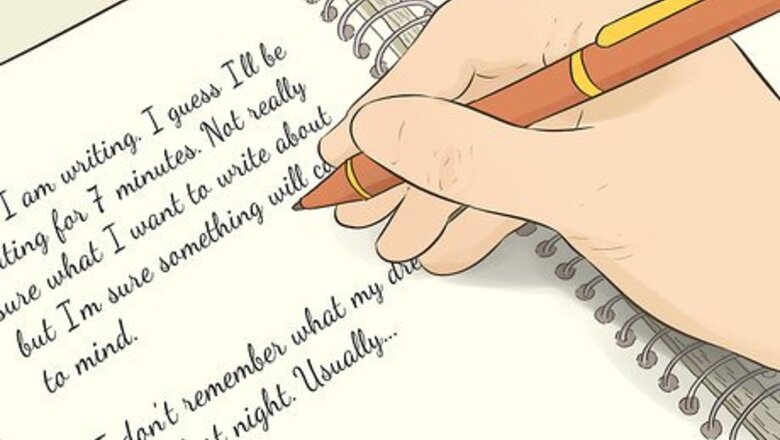
views
- Don’t worry about how it sounds; write about how you feel. You don’t have to follow any writing conventions—just let it all out in whatever way feels best to you.[1]
- Write about how you wish the situation could've gone. What would you have done differently if you had the chance to do it all over again?
- Make time to write every day. The more you sit down to express your emotions, the easier and more natural it will become!
Journaling to Process Your Emotions

Practice free-writing to help your feelings flow. Don't worry if the words don't come out perfectly! Just write what you feel without thinking about properly constructed sentences or paragraphs. This will allow you to focus on your emotions rather than your writing style. As long as it feels good to you, it's fine. If free writing feels like too much, check out these prompts below: How has my day been so far? What has been coming up for me? Has there been anything stressful? Has there been anything that's been on my mind? Is there then anything that I might need to work out or problem solve? Don't worry about errors. Turn off the spell check feature if it's distracting you.
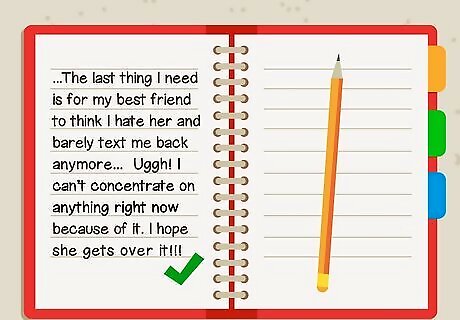
Write about a situation you wish had gone differently. Sometimes you might feel things such as frustration about an experience you recently had. In your journal, write about the situation that you are feeling emotional about. Then, rewrite the experience with a different ending. Write about how you wish things had worked out. This can give you a lot of insight about ways you can handle things differently in the future. Or, try writing about a current problem: What are the steps I need to take in order to address this issue? What are some different ideas I can come up with to help me tackle whatever it is that's going on? For example, maybe you want to write about a fight you just had with your best friend. You can note what you talked about and then explain that the fight left you feeling like you weren't being valued. Both of you walked away without resolution. In your new version, write what you wish you had said differently. Maybe you could write that you convinced your friend to listen to you and you came to an understanding.
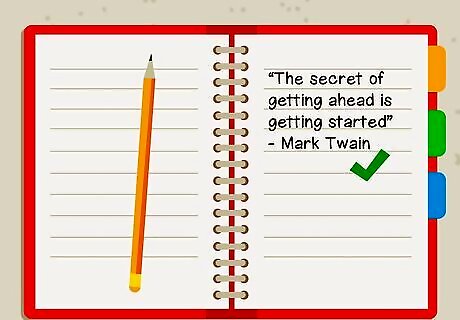
Use quotes to inspire your writing. It can be tough to start writing sometimes. Think about a quote that you find interesting and use that as a writing prompt. You can write about how the quote makes you feel, or you can write about how you relate to it. You could select a quote such as this one from Dr. Joyce Brothers: "A strong positive self-image is the best possible preparation for success." You could then write about how you've been feeling less confident lately and how that's been impacting your performance at work. After processing these feelings, you could use that as a springboard to write about ways that you can improve your self-image.

Use your journal to help you figure out answers to your questions. If quotes aren't your thing, you can create your own writing prompts using questions. Each time you ask yourself a question, write it down on a scrap of paper and place it in a bowl or jar. When you're feeling stuck, take out one of the questions and answer it in your journal. Your questions could include things like: What are some of the reasons I love Riley so much? Why do presentations make me nervous? How come I feel so much better after yoga?
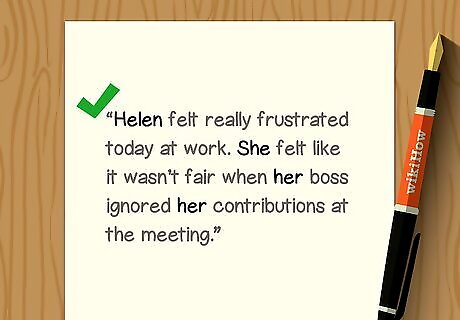
Try writing in the third person if you're feeling stuck. It can be hard to write about powerful feelings. If you're feeling uncomfortable or dealing with writer's block, shift the perspective. Use your name (or a made-up name) instead of saying “I” or “my” when talking about your feelings. You could write, “Helen felt really frustrated today at work. She felt like it wasn't fair when her boss ignored her contributions at the meeting.”
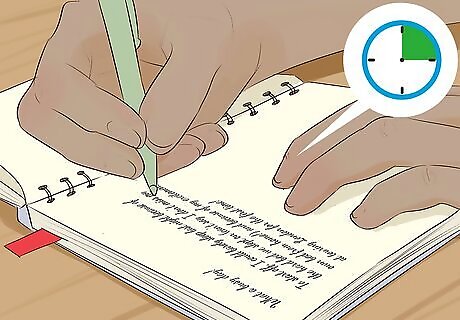
Make time to write every day. The more you write, the more comfortable you'll feel. If you carve out a little time each day, expressing your emotions will soon feel like second nature. That's important because expressing your feelings can go a long way to relieving any stress or anxiety you're feeling. You don't have to devote large amounts of time to writing. Even 5 minutes a day help! Don't force yourself to write. If you really aren't feeling up to it, don't write that day. No one's judging you.

Choose a journal format that feels comfortable and easy. You can record your feelings any way you want! If you want to be able to write anytime, choose a small notebook that can fit in your pocket or bag. Maybe you want to make journaling feel like a special experience. Consider buying a Moleskine or other nice looking journal. Keeping an electronic journal is also a great choice. Try using a program such as Google docs that will save your work automatically. You can also access it from any device.

Share your journal if you think that would be helpful. If you are in counseling, your therapist might be interested in seeing your journal. Showing them some excerpts might allow them to have greater insight into how to help you. Or maybe you want to share your writing with a friend. That can be a great way to help them understand your feelings. Don't feel like you have to share your writing with anyone. It's totally fine to keep it private.

Find a place to write where you won't be disturbed. Writing about your feelings is a very personal experience. Look for a spot to write where you will feel comfortable and calm. Try to choose a place where no one will be asking for your attention. A comfy chair in a corner of your home might feel right to you. You could also head to a nearby park for some fresh air while you write. Pick a time of day where you have 15-20 minutes to sit down and write.
Using Other Creative Formats to Express Your Feelings
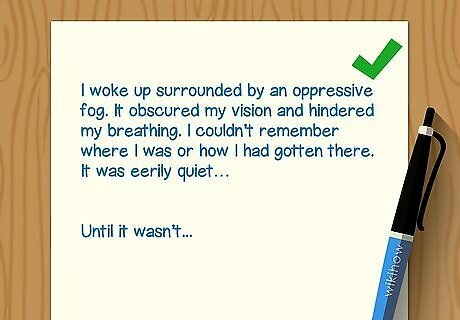
Write a short story to describe your thoughts. Creative writing is a great way to express your feelings on paper. Try writing a short story that is based on something you have experienced. It could be something from your past or a current situation that you're in. Maybe you're going through a tough breakup. Write a story about someone else who is dealing with that.
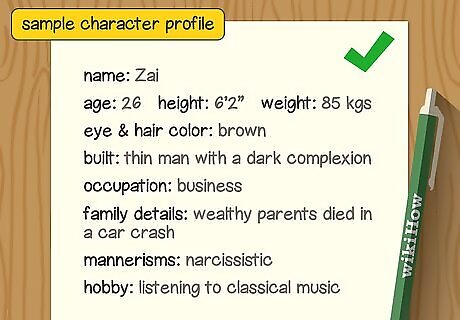
Create a character to help you work through tough circumstances. Sometimes it's difficult to process your emotions. Try creating a fictional character based on yourself. This will help you work through your emotions while maintaining the distance you need. Let the character talk about how they are feeling. For example, maybe you've had an argument with an old friend. Come up with a character that is going through the same thing. You could create a dialogue of your character talking to their “fictional” friend. Don't be afraid to have a little fun with this! Maybe you've always wanted to travel the world. Let your character do that while experiencing “their” emotions.

Write dialogue to help your character express emotion. Talking is a great way to express yourself. By writing dialogue, your character can do that for you! You could write about a conversation between 2 friends who have recently had a disagreement. For example, your character could say something like, "Hey, it really bothers me when you're always late. It makes me feel like you don't value me. What gives?"
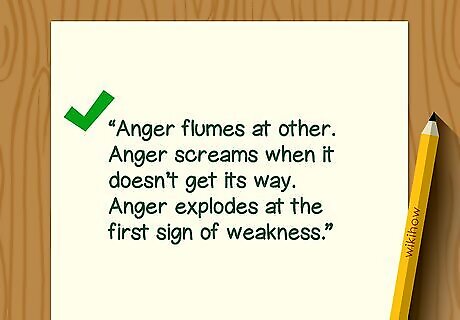
Write a poem to connect with your feelings. Poetry is a great way to let your emotions out. What's neat about it is that you can make it entirely free form! You can choose to write in sentences or not. You can play with capitalization, punctuation, or find other ways to make it feel more personal. Choose 1 emotion to focus on and shape your poem around that. For example, you could create a poem about feeling lonely. You can create multiple poems as you work through your feelings.

Pen song lyrics to put your feelings on paper. Listening to your favorite song can bring up a variety of emotions. It only makes sense that writing a song can be emotional, too. You don't have to be a musician to write lyrics. Simply write verses about your experiences and what you're feeling. Add a chorus to highlight your main feelings. Maybe you are newly in love. You can write verses about your first date, that fluttery feeling in your stomach, and feeling excited. Your chorus could be about not being able to wait to see that special someone again.
Describing Your Feelings to Someone Else
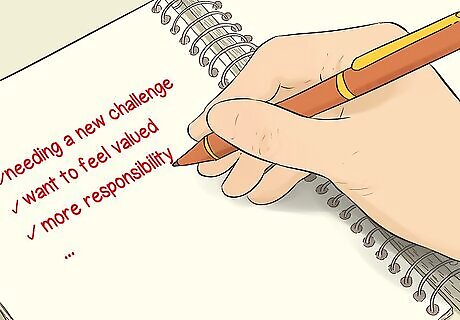
Jot down your main points before you start the letter. A written message is a great way to let someone know how you are feeling. To make sure you include everything important, take a few minutes to write down the most significant themes that you want to include. You don't need to write in complete sentences; a few keywords or phrases will suffice. Maybe you want to let your partner know that you would like to spend more time together. You might write down things like, “date-nights, no cell phones after 9 p.m., nightly dinner.” You might want to explain to your boss why you feel you deserve a raise. Your notes might include, “needing a new challenge, want to feel valued.”
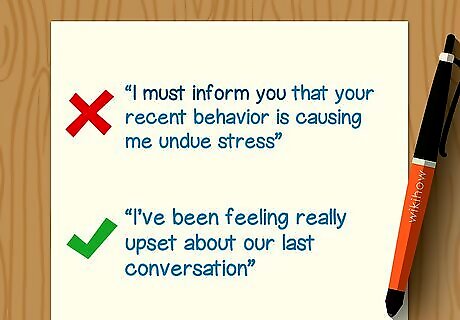
Write your feelings in the same way you talk in the body of the letter. There's no need to try to use sophisticated or flowery wording. You want your reader to easily understand how you feel, so write as if you were having a conversation. Work on making your sentences bold and concise. Instead of writing, “I must inform you that your recent behavior is causing me undue stress,” just say, “I've been feeling really upset about our last conversation.”
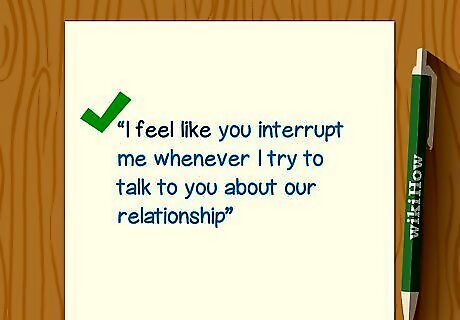
Use “I" statements to express your emotions. Starting with the word “I” keeps the focus on the main point--your feelings. When expressing emotions, make sure to begin a lot of sentences with the word “I”. This will also help prevent the other person from feeling defensive. For example, you could write to your partner, “I feel like you interrupt me whenever I try to talk to you about our relationship.” If you're writing to your boss, you could say, “I feel like I deserve the opportunity to take on more responsibility.” The body of the letter can be as long or as short as you like. Even a paragraph or 2 can help you get your point across.
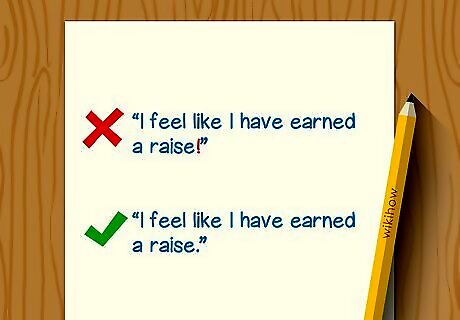
Choose your punctuation marks carefully. Have you ever felt like an email was yelling at you? That's probably because the writer used an excessive amount of exclamation marks. Try to avoid that when you're writing your email or letter. You don't want to seem angry or upset, especially if this is a business letter. For example, write, “I feel like I have earned a raise.” “I feel like I have earned a raise!” might seem aggressive. Also try to avoid using a lot of bold font or italics. These can also make your reader feel defensive.

Choose your greeting and sign off based on who the letter is to. If you are writing a professional letter, it's a good idea to be more formal. You could start the letter with "Dear" and sign off with "Sincerely" or "Respectfully". If you're writing to a friend or family member, you can be more casual. You can still start with "Dear," but consider a sign off like "Love" or "Yours truly" for a more personal feel.

Edit until you are happy with what you wrote. After you've composed your message, read it again. If you're not happy with any of your phrases, try wording them differently. You can also check for typos. If this is a very personal letter, try putting it away for a day. You can come back to it the next day and look at it with fresh eyes. You might feel better after writing and decide you don't need to send the letter. In that case, don't worry about editing!



















Comments
0 comment